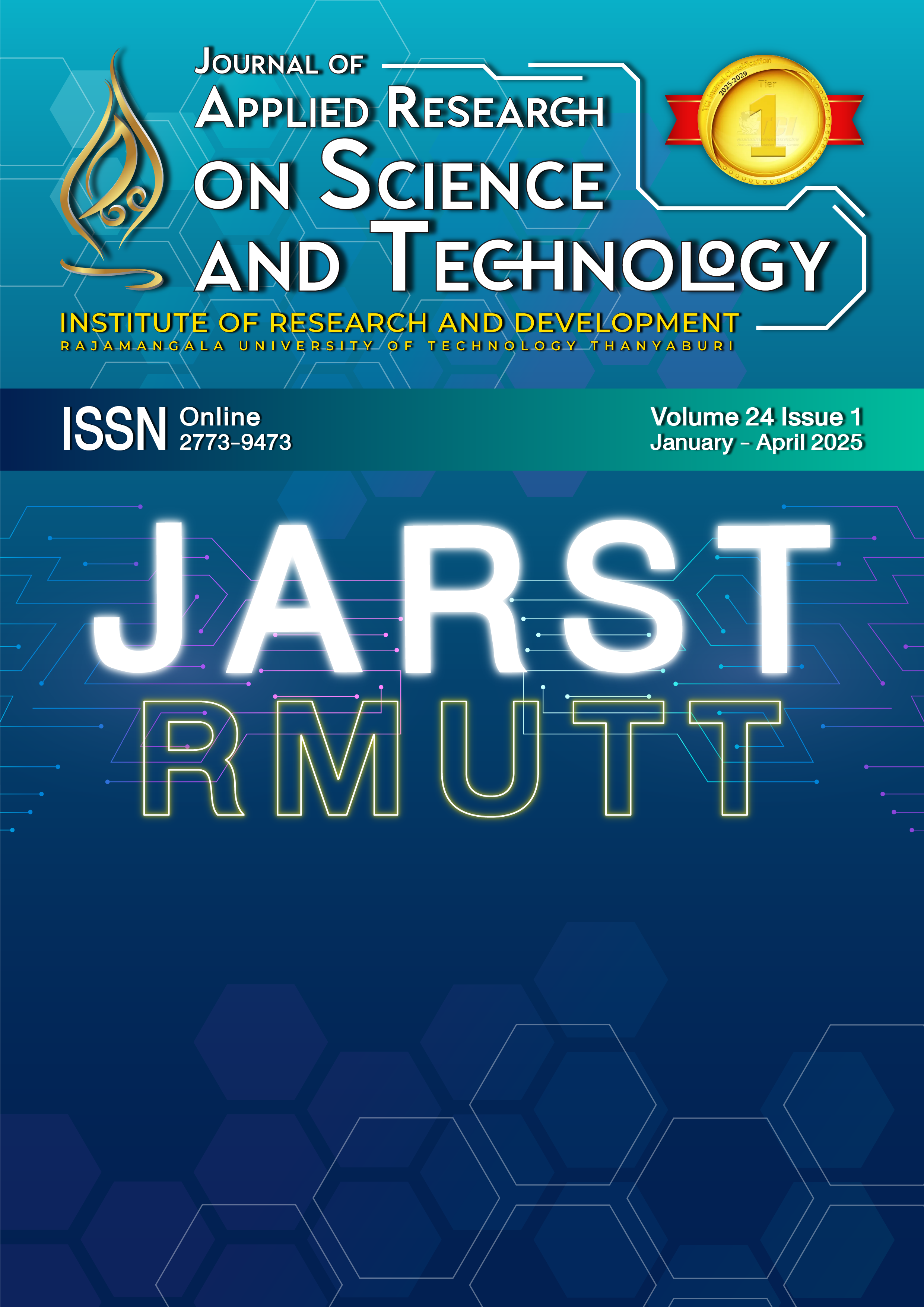Increasing the value of jackfruit cobs as agricultural waste materials for syrup production by enzymatic hydrolysis using pectinase and cellulose
Main Article Content
Abstract
This research aimed to investigate the optimal working conditions for pectinase and cellulase, evaluate the quality of jackfruit cob syrup, and assess its physical and chemical properties and consumer acceptance. The study began with exploring the optimal conditions for syrup production from jackfruit cobs. The factors studied were the amount of pectinase in 3 levels: 0.04, 0.06, and 0.08%; the amount of cellulase in 2 levels: 0.1 and 0.2%; and the incubated temperature in 3 levels: 40, 45, and 50 °C; the incubated time in 3 levels: 30, 90, and 150 minutes. All 54 conditions were obtained in Factorial experiments in Completely Randomized Design (CRD). The physical and chemical properties were analyzed, and the optimal conditions were determined through hierarchical clustering, along with evaluating the physical and chemical properties and consumer acceptance. It was found that the optimum conditions for extraction of jackfruit cob juice include 0.08% pectinase, 0.2% cellulase, incubated temperature at 40 °C, and a curing time of 90 minutes, respectively. The properties of jackfruit cob syrup were as follows: brightness (L*) of 22.77 ±0.04, (a*) of -0.74 ±0.06, and (b*) of 9.16 ±0.43. The light transmittance was 1.99 ±0.01, viscosity was 14.00 ±0.05 centipoise, and pH was 4.75 ±0.10, indicating prebiotic properties. The overall liking score was 7.96. After being informed about the nutritional benefits of jackfruit cob syrup, 85.00% of consumers indicated a willingness to purchase the product. It will add value to the waste jackfruit cob in agriculture to 86 baht per kilogram. Therefore, jackfruit cob syrup is a value-added product that enhances the utilization of agricultural by-products, reduces agricultural waste, and meets consumer demand for healthy food options.
Article Details

This work is licensed under a Creative Commons Attribution-NonCommercial-NoDerivatives 4.0 International License.
References
Charawae A. Development of edible film from Kluai Nam Wa Masa (ABB group) [Master's thesis]. Bangkok: Kasetsart University; 2007. Available from: https://doi.nrct.go.th/ListDoi/listDetail?Resolve_DOI=10.14457/KU.the.2007.122.
Mongphimai K. Development of food wrapping sheets from jackfruit fiber [Master's thesis]. Pathum Thani: Rajamangala University of Technology Thanyaburi; 2012.
Wongarun W. Added value of household waste jackfruit seeds. WMS J Manag. 2018;7(2):43-53. Available from: https://so06.tci-thaijo.org/index.php/wms/article/view/135681.
Chaiyo M. Qualitative comparison of banana syrup from refined sugar and non-refined sugar [Master's thesis]. Nakhon Nayok: Srinakharinwirot University; 2011.
ICT Center, Office of the Permanent Secretary, Ministry of Commerce, in collaboration with the Customs Department. Statistics report [Internet]. n.d. Available from: http://www.customs.go.th/list_strc_link.php?ini_content=statistics_report&iang=th&left_menu=nmenu_esevice_007.
Phukasmart U. Sugar and the importance of sweeteners. Food J. 2013;43(1):33-9.
Thaiphanit S. Enzymatic processing and spray drying of jackfruit (Artocarpus heterophyllus Lamk.) syrup powder. J Food Technol. 2012;7(1):19-23. Available from: https://li01.tci-thaijo.org/index.php/JFTSU/article/view/38361.
Warawit W. Probiotic and prebiotics. J Clin. 2008;27(2):19-23. Available from:https://www.doctor.or.th/clinic/detail/6931.
Damkham C, Chomnawung M. Do you know prebiotics yet. J Food. 2005;5(2):96-101. Available from: https://kukrdb.lib.ku.ac.th/journal/FOOD/search_detail/result/29469.
Kwairakan C. Production of concentrated syrup from Leb Mu banana [Musa (AA group)] by using pectines [Master's thesis]. Bangkok: Chandrakasem Rajabhat University; 2012.
Prapinagsorn W, Pengnet N, Munrot D, Sanichwan N. Production of syrup from cashew apples. KKU Sci J. 2011;40(3):913-23. Available from:https://ph01.tci-thaijo.org/index.php/KKUSciJ/article/view/253291.
Wachirasakchai M. Development of sugar product from Muntingia calabura L. for adding value to agricultural products [Master's thesis]. Pathum Thani: Rajamangala University of Technology Thanyaburi; 2016.
Saenjaiban N. Selection of strawberry cultivars and suitable pectinase utilization conditions for the extraction of strawberry juice [Research report]. Chiang Mai: Chiang Mai University; 2007. Available from: https://doi.nrct.go.th/ListDoi/listDetail?Resolve_DOI=10.14457/CMU.res.2007.15.
Panyasawan C. Development of concentrated syrup from golden bananas by using enzymes [Master's thesis]. Bangkok: Kasetsart University; 2004.
Sutchane J, Hutangkul C, Kamkomkat P, Kumseewai P. Screening of cellular production from thermotolerant fungi using sugarcane bagasse hydrolysate as a substrate of ethanol by Saccharomyces cerevisiae [Master's thesis]. Maha Sarakham: Rajabhat Maha Sarakham University; 2013.
Katajit P. Chemical description of black. 1st ed. Bangkok: IPST Publisher; 2018. Available from: https://www.scimath.org/article-chemistry/item/8474-2018-07-18-04-06-45.
Pheantaveerat A, Anprung P. Effect of pectinases, cellulases and amylases on production of banana juice. J Food (Thailand). 1993;23(3):188-96. Available from: https://kukrdb.lib.ku.ac.th/journal/FOOD/search_detail/result/234442.
Kwairakan C. Production of concentrated syrup from Leb Mu banana [Musa (AA group)] by using pectines [Master's thesis]. Bangkok: Chandrakasem Rajabhat University; 2012.
Suksringam B. General microbiology. 3rd ed. Bangkok: Odeon Store Publisher; 1991.
Wongputtisin P. Primary prebiotic properties of ethanolic sugar extract from bean seeds. J Food Technol [internet]. 2017;13(2):11-23. Available from: https://li01.tcithaijo.org/index.php/JFTSU/article/view/135273.


